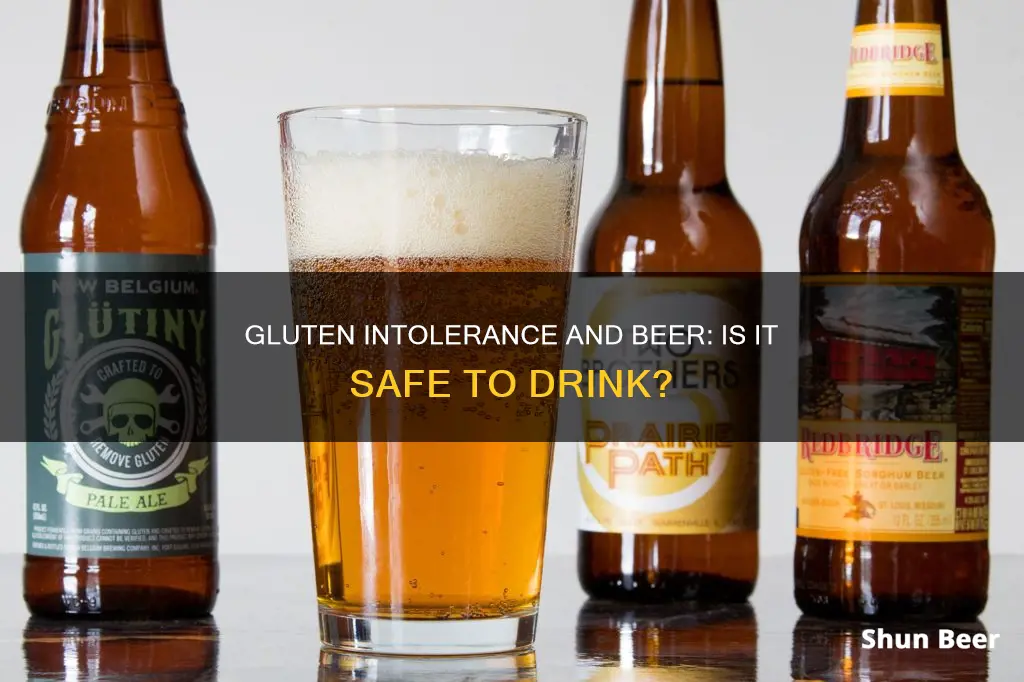
Beer is typically made from grains that contain gluten, such as barley, wheat, and rye. As a result, most beers are unsuitable for those with gluten intolerance, including coeliac disease, wheat allergy, or non-coeliac gluten sensitivity. However, there are gluten-free options available, which can be broadly categorized into two types: beers made with grains that don't contain gluten, such as sorghum, buckwheat, or rice, and beers that have undergone a process to break down the gluten into smaller compounds during manufacturing. While these options exist, people with gluten intolerance should still exercise caution when consuming beer, as gluten contamination can occur if a brewery produces both gluten-free and gluten-containing varieties.
What You'll Learn

Gluten-free beers
If you're gluten intolerant, you may think that beer is off the menu. However, brewers around the world are working to produce beers that can be enjoyed by people with coeliac disease or a general gluten sensitivity.
- Ghostfish Brewing Company: This Seattle-based brewery produces award-winning gluten-free beers, including the Grapefruit IPA and the Shrouded Summit Belgian White Ale.
- Ground Breaker Brewing: A dedicated gluten-free brewery in Portland, Oregon, that uses gluten-free grains and is certified gluten-free. They offer a variety of beers, including the Dark Ale and the Inclusion Dry Hopped Pale Ale.
- Holidaily Brewing Company: A female-owned, gluten-free brewery in Golden, Colorado, that uses native grains like millet and buckwheat. Their Buckwit Belgian and Blonde Ale are popular choices.
- Glutenberg Craft Brewery: A Canadian brewery that cracked the code of brewing a witbier without wheat. Their Blanche beer uses quinoa, buckwheat, millet, and amaranth to recreate the classic Belgian witbier style.
- New Planet Beer: Their Blonde Ale is a refreshing gluten-free option made with millet, gluten-free oats, and blue corn.
- Burning Brothers Brewing: A gluten-free brewery specialising in beers like the Roasted Coffee Strong Ale, which features caramel and cold-brew coffee flavours.
Remember to always read the labels and look for certified gluten-free options to ensure the beer is truly gluten-free.
Beer's Anti-Inflammatory Benefits: Fact or Fiction?
You may want to see also

Gluten-removed beers
The effectiveness of the gluten removal process has not been scientifically proven, and the gluten content of gluten-removed beers may vary between batches. According to the FDA, gluten-free beers must contain less than 20 parts per million (ppm) of gluten. Gluten-removed beers fall under this threshold, but they are not completely gluten-free.
A study found that several blood samples from people with coeliac disease reacted to gluten-removed beer, indicating that it still contained some gluten fragments and may not be safe for people with coeliac disease. Experts recommend that people with coeliac disease avoid gluten-removed beers and opt for beers labelled as gluten-free.
- Omission Beer
- New Belgium Glutiny brand Golden and Pale Ales
- Alley Kat Scona Gold Kölsch
- Estrella Damm Daura Marzen
- Widmer Omission Lager
- Stone Brewing Delicious IPA
Beer Trading: How Does It Work?
You may want to see also

Celiac disease and gluten intolerance
Celiac disease is an autoimmune disorder affecting about 1.4% of the world's population, or 112 million people. When people with celiac disease consume gluten, their body's immune system attacks itself, causing inflammation and damage to the lining of their small intestine. This results in a reduced ability to absorb nutrients from food, leading to symptoms such as nutrient malabsorption, diarrhea, weight loss, anemia, osteoporosis, brain fog, infertility, and skin issues. However, about half of those with celiac disease may not experience any noticeable symptoms.
Celiac disease is not a food allergy or intolerance but an autoimmune disease. It is diagnosed through a blood test or intestinal biopsy, and the only treatment is a strict lifelong gluten-free diet. Even a small amount of gluten, such as 1/64 teaspoon of flour, can trigger symptoms in people with celiac disease.
Gluten intolerance, or non-celiac gluten sensitivity (NCGS), is different from celiac disease. While it shares similar symptoms, it does not typically have as severe an impact on overall health. People with NCGS may find relief by reducing gluten and carbohydrate intake, whereas those with celiac disease must avoid gluten entirely. The exact mechanism of NCGS is not well understood, and there is ongoing research to better define the condition.
For those with celiac disease or gluten intolerance, beer poses a challenge as it is traditionally made with barley, hops, yeast, and sometimes wheat, all of which contain gluten. However, there are now gluten-free beers available that are made with alternative grains like sorghum, buckwheat, or rice, which do not contain gluten. These beers are suitable for those with celiac disease or gluten intolerance. Additionally, some beers are labelled as "gluten-removed," but these may still contain traces of gluten and may not be safe for those with celiac disease.
Beer and Glutathione: A Healthy Mix?
You may want to see also

Gluten-free alternatives
If you're looking for gluten-free alternatives to beer, there are plenty of options to choose from. Here are some of the best gluten-free alternatives that you can enjoy:
Gluten-Free Beer
Firstly, you can opt for gluten-free beers, which are made with grains that don't contain gluten, such as sorghum, maize, millet, buckwheat, rice, or oats. These beers are suitable for people with celiac disease or gluten sensitivity. Some recommended brands include:
- Bard's Sorghum Beer
- Glutenberg
- Green's
- Lakefront Brewery's New Grist Gluten-Free Pilsener
- New Planet
Alcoholic Ginger Beer
Alcoholic ginger beer is a spiced drink with the addition of alcohol. While not all varieties are gluten-free, some options include:
- Crabbie's Original Alcoholic Ginger Beer (UK only)
- Barritt's Original Ginger Beer
- Fentimans Ginger Beer
- Ginger's Revenge
- Islander Ginger Beer
Hard Cider
Hard cider is naturally gluten-free as it is made from fermenting apples and yeast. However, always check for a gluten-free label to ensure no gluten-containing ingredients or cross-contamination. Recommended brands include:
- Woodchuck Cider
- Magners
- Angry Orchard
- Stella Cidre
- J.K.'s Scrumpy Hard Cider
Mead
Mead is an ancient alcoholic beverage made from fermented honey and water, and it is completely gluten-free. It can be dry or sweet, still or sparkling, and comes in various styles. Some recommended meaderies include:
- B. Nektar
- Batch Mead
- Apis Mead and Winery
- Wehrloom Honey and Meadery
Other Gluten-Free Alcoholic Drinks
In addition to the above, there are other alcoholic drinks that are typically gluten-free:
- Wine: Naturally gluten-free, including red, white, sparkling, port, sherry, vermouth, brandy, and rice wine.
- Distilled Spirits: While they may be made from gluten-containing grains, the distillation process removes the gluten. Options include rum, tequila, vodka, gin, whiskey, and brandy.
- Liqueurs: Popular gluten-free options include Amaretto, Aperol, Bailey's, Cointreau, Kahlua, Southern Comfort, and Triple Sec.
- Hard Seltzers: Naturally gluten-free, but check labels as some use fermented malted barley.
The Science of Nitro Beers: How Do They Work?
You may want to see also

Country-specific labelling
United States
The US Food and Drug Administration (FDA) defines "gluten-free" for food labelling, allowing consumers, especially those with celiac disease, to be confident that "gluten-free" labelled products meet a defined standard. The FDA's regulation specifies that products labelled as "gluten-free," "no gluten," "free of gluten," or "without gluten" must contain less than 20 parts per million (ppm) of gluten. This level is the lowest detectable amount using scientifically validated methods. The regulation is voluntary, and manufacturers choosing to label their products as gluten-free must comply with all requirements.
Europe
In Europe, products containing no more than 20 ppm of gluten can be labelled as "gluten-free." Additionally, an extra category of “very low gluten” can be used for products containing up to 100 ppm of gluten.
Australia and New Zealand
Australia and New Zealand have some of the strictest legislation concerning gluten-free labelling. Products containing 20 ppm or less can be labelled as "low gluten" but not "gluten-free." For a product to be labelled "gluten-free," it must not contain any detectable gluten. All ingredients derived from gluten-containing grains, no matter how small the amount, must be declared on the food label.
Canada
In Canada, all certified gluten-free products must contain under 20 ppm of gluten. Any intentionally added gluten-containing ingredients must be listed on the product. Canadian residents also receive tax deductions for the extra cost of gluten-free foods compared to their gluten-containing counterparts.
Argentina
Argentina has implemented the "National Program for the Detection and Control of Celiac Disease," which includes strict labelling restrictions and a national logo for all certified gluten-free packaged foods. Healthcare providers in Argentina cover the cost of alternative flours and gluten-free mixes for residents.
United Kingdom
Over 90% of British celiac patients receive gluten-free food as part of their prescription for the gluten-free diet, allowing them to access these foods at a heavily discounted price.
These varying standards for gluten-free labelling highlight the importance of understanding the regulations in different countries, especially for those with celiac disease or gluten intolerance.
Beer and Vodka: Mixing Alcohol Safely
You may want to see also
Frequently asked questions
Gluten is a term that refers to the hundreds of proteins found in wheat, barley, rye, and triticale (a hybrid of wheat and rye).
People who are intolerant to gluten may experience concerns such as nutrient malabsorption, diarrhea, weight loss, anemia, osteoporosis, brain fog, infertility, and skin issues.
Beers that are made with gluten-free grains such as sorghum, maize, millet, oats, amaranth, buckwheat, and quinoa are suitable for people with gluten intolerance. Some popular brands include Redbridge, New Planet, and Glutenberg.







